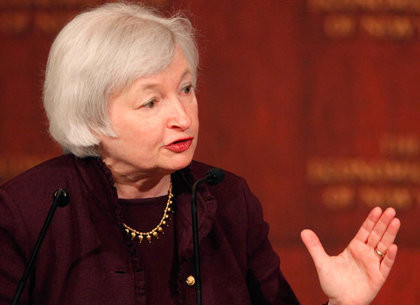Janet Yellen, President Obama’s choice to head the Federal Reserve, brings a unique combination of the old and the new to the position.

Janet Yellen, vice chairwoman of the Federal Reserve Bank, speaks at the Economic Club of New York (AP Photo/Mark Lennihan)
President Obama yesterday announced Janet Yellen as his choice to head the Federal Reserve and take the economic reins from Ben Bernanke, who has since early 2006 headed the hugely influential regulatory body.
What does Yellen’s nomination, though, mean for the economy, if not the housing market? Here are five interest details about Yellen that you should know:
1. She Has Plenty of Experience – One thing about Yellen that is inarguable is her extensive experience. In addition to her considerable academic experience, which included stints at Harvard and the University of California, Berkeley (where she is a professor emeritus), she served six years as president of the San Francisco Fed; was head of the White House Council of Economic Advisors for Bill Clinton from Feb. 1997 to August 1999; and has been the vice chairperson at the Fed (essentially it’s No. 2 person) for the last three years.
2. A Woman Takes Charge – Should Yellen be confirmed to head the Federal Reserve, she’d not only be the first woman to head the banking system, but the first woman to head the central bank of any advanced nation. And considering the Fed’s enormous economic powers, which include control over the nation’s interest rates (and resulting lending behaviors) and the power to print money at will, Yellen would arguably be the second most powerful person in the country, second only to the president.
3. She’ll Be a “Dove” of a Banker – Okay, so Yellen is a woman – and a highly qualified one at that – but what would her nomination mean for the housing market? Well, as John Cassidy recently explained in The New Yorker, Yellen would very much carry on the tradition of Ben Bernanke, meaning a proactive, aggressive monetary policy aimed at lowering the nation’s unemployment rate; such bankers are called “doves” in bank-speak.
4. Expect More Bernanke-omics – Though she’s no radical, Cassidy suggested that Yellen could be the biggest “dove” to head the Fed since Marriner Eccles in the ’30s; in other words, should the economy taper during Yellen’s tenure, expect the low mortgage rates and looser money policies that have defined Bernanke’s tenure – rates that she fully endorsed as his No. 2.
5. Her Nomination is Favored by Investors – Finally, Yellen seems to be on the good side of Wall Street. Not only did the stock market react positively to news of her nomination, but influential financiers offered some fairly glowing quotes to the press about her capabilities. One notable example came from Dan Fuss, a portfolio manager at Loomis Sayles in Boston: “Thank God Yellen will be nominated under the current circumstances. You don’t want a change at the central bank right now . . . This Yellen news is one uncertainty lifted from already nervous markets.”
